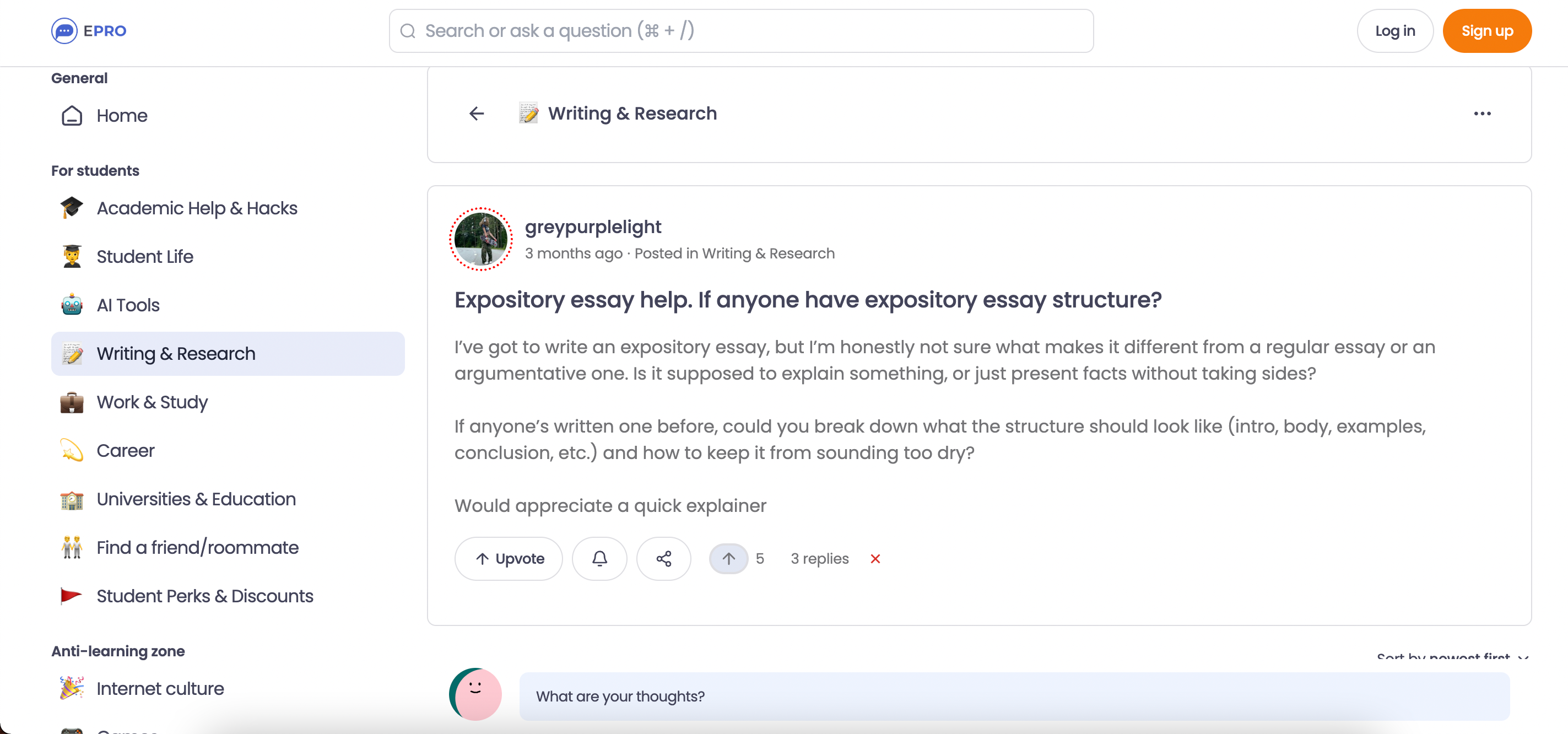In the realm of academic writing, this type of essay stands as a beacon of clarity, demanding writers to illuminate a subject with precision and objectivity. This form of essay invites you to delve into expository essay topics, dissect their intricacies, and present your findings in a straightforward manner.
In this guide, we will explore how to write an expository essay, unraveling the techniques and strategies that transform a mere composition into a beacon of insight. Or, you can get EssayPro's essay writing help and take care of other important tasks set for today.
What Is an Expository Essay
An expository essay is a form of academic writing that aims to elucidate, clarify, and present a balanced analysis of a particular topic or idea. Unlike other essay types that may delve into personal opinions or narratives, the expository essay emphasizes objectivity and factual accuracy. The primary objective is to provide a clear and comprehensive explanation of the chosen subject, exploring its various facets, presenting evidence, and ensuring a logical progression of ideas.
According to an expository essay definition, this genre requires the writer to delve into research, organize information systematically, and deliver a coherent and informative piece that educates the reader on the chosen topic. Whether investigating a scientific concept, historical event, or literary work, it serves as a vehicle for conveying knowledge in a concise, lucid manner.
.webp)
The Purpose of Expository Writing
Expository writing aims to get straight to the point without any fluff or personal opinions. An expository essay in academic circles provides clear, properly organized information that actually makes sense. This assignment helps students break down complicated concepts to make them easier to understand without sounding like they're rambling.
A good expository essay makes sure the reader walks away knowing something they previously didn't. If you know how to lay out facts in a logical way, your readers will be left with the information they can actually use instead of a headache.
💡 From Concept to Practice
If you want more than just the theory, head over to our EssayPro Community thread where people share their experiences, favorite structures, and helpful tips for writing clear, informative essays.

Expository Essay Examples
An expository essay example serves as a valuable tool for students, offering a concrete illustration of the structure, style, and depth expected in this genre of writing. By studying examples, students gain insights into the details of writing an expository essay and all its steps: formulating a thesis, organizing ideas, and integrating supporting evidence to bolster arguments.
Additionally, examples showcase how to balance factual accuracy and engaging prose, providing a model for clear and concise communication. Students can draw inspiration from the content and presentation of well-crafted expository essays, honing their own skills in research, analysis, and effective expression. By the way, we have an interesting autobiography example, so check it out!
Example 1: “The Evolution of Artificial Intelligence”
This expository essay explores the multifaceted evolution of artificial intelligence (AI), examining its historical roots, contemporary applications across various industries, and the consequential societal impact. It provides a comprehensive overview of AI's journey from philosophical debates and early computational developments to its current role as a transformative force in healthcare, finance, manufacturing, and entertainment. Additionally, the essay addresses ethical considerations surrounding the widespread adoption of AI, including concerns related to job displacement, privacy, and responsible development. Ultimately, it navigates the complex landscape of artificial intelligence, shedding light on its remarkable advancements and its challenges to our ever-changing society.
Example 2: “The Benefits of Outdoor Education for Children”
This essay highlights the advantages of outdoor education for children, emphasizing its positive impacts on their physical, mental, and social development. It argues that outdoor activities like hiking, camping, and team sports not only promote physical health by encouraging movement and reducing sedentary behavior but also contribute to mental well-being by providing a respite from everyday stressors and fostering a connection with nature. Furthermore, it suggests that exposure to outdoor environments cultivates environmental awareness and a sense of stewardship among children.


Types of Expository Essay
Not all expository essays follow the same formula. Sure, all of them focus on explaining something clearly, but the approach we use when writing an expository paper varies depending on the topic and the assignment's purpose. Let's take a closer look at the most common types so you can pick the right structure for your specific essay.
- Descriptive Expository Essay. This type focuses on painting a vivid picture of a subject, using sensory details to engage the reader's imagination. It aims to create a clear and sensory-rich portrayal of a person, place, object, or experience.
- Process Expository Essay. Here, the writer breaks down a complex process or procedure into manageable steps, providing a detailed and sequential explanation. This type of essay is instructional, guiding readers through a series of actions to achieve a specific outcome.
- Comparison and Contrast Expository Essay. This form involves analyzing similarities and differences between two or more subjects, offering insights into their shared characteristics or divergent qualities. It requires a careful examination of the chosen elements to highlight their relationships.
- Cause and Effect Expository Essay. Focused on exploring the reasons behind an occurrence and its subsequent consequences, this type delves into the cause-and-effect relationships within a given topic. Writers elucidate the connections between actions and outcomes, fostering a deeper understanding of the subject matter.
- Problem and Solution Expository Essay. Addressing real-world issues, this essay type identifies a specific problem, analyzes its root causes, and proposes viable solutions. It encourages critical thinking and problem-solving skills, compelling readers to consider alternative approaches to challenges.
- Definition Expository Essay. This essay seeks to clarify and explain the meaning of a particular term, concept, or idea. Writers provide a comprehensive definition, often including examples and illustrations to ensure readers grasp the essence of the subject.
- Cause and Effect Expository Essay. This type of essay examines the reasons behind a particular phenomenon or event and explores its subsequent effects. It aims to establish a clear cause-and-effect relationship, allowing readers to comprehend the interconnected elements of the topic.
Understanding these diverse types of essays empowers writers to choose the most suitable approach for effectively conveying information and achieving their communicative goals.
How to Write an Expository Essay Step by Step
Writing an expository essay involves a systematic process that ensures clarity, coherence, and effectiveness in conveying information. Unlike the argumentative essay format, which takes a specific stance on a topic, expository writing aims to present well-researched facts without bias. Here is a step-by-step guide to help you craft an expository essay:
Choose a Topic
- Select a topic that interests you and aligns with the purpose of an expository essay – to inform, explain, or analyze a subject.
Conduct Research
- Gather relevant and credible information to support your chosen topic.
- Utilize reputable sources such as academic journals, books, and reliable websites.
Create an Outline
- Develop a clear and organized outline that includes the introduction, body paragraphs, and conclusion.
Understand How to Start an Expository Essay
- Do you want to know what is typically included in the introductory section of an expository essay? The golden rule is to always start with an attention-grabbing hook that relates to your topic.
- Provide background information and context, leading to a concise and focused thesis statement that outlines the main idea.
Develop Body Paragraphs
- Each body paragraph should begin with a clear topic sentence that introduces the main point.
- Support the topic sentence with evidence, facts, or examples.
- Ensure a logical flow between paragraphs, using transitions to guide the reader.
Provide Evidence
- Support your points with credible evidence and examples.
- Ensure that each piece of evidence directly relates to the topic sentence and supports the overall thesis of the essay.
Analyze and Interpret
- After presenting evidence, analyze and interpret it.
- Explain the significance of the evidence and how it relates to your thesis.
- This step helps to ensure that your audience understands the relevance of the information presented.
Write the Expository Essay Conclusion
- Summarize the main points discussed in the body paragraphs without introducing new information.
- Restate the thesis in different words and offer concluding insights or implications related to the topic.
Revise and Edit
- Review your essay for clarity, coherence, and consistency.
- Check for grammatical errors and awkward phrasing, ensuring a smooth flow of ideas.
- Consider feedback from others or take a break before revising to gain a fresh perspective.
- Carefully proofread your essay to catch any remaining errors, typos, or issues.
- Pay attention to grammar and punctuation.
By following these steps, you can systematically approach the writing process and create a well-organized and informative expository essay. If you find it hard to properly put your thoughts out on a page, working with a professional research paper service can always help you craft coherent assignments.
Expository Paper Due?
Our pros have got this. Join 10,000+ students who let us do the heavy lifting every month.
Final Thoughts
Strong expository writing isn't just about filling pages up with random words. In order to make your essay actually worth reading, you need to organize your ideas in a clear and concise manner. If you understand the expository essay meaning, you probably also know how important it is to break complex concepts down in a way that's digestible for the reader.
If building a proper expository paper feels overwhelming for you, don't worry; you are definitely not alone. It can be tricky to get everything right the first few times, but the more you practice, the easier it gets, so you'll write expository essays like a pro before you know it!
If putting your thoughts into words feels like wrestling with a blank page, EssayPro's college essay writer can turn any tedious assignment into polished, well-structured papers you'll be proud to submit.
FAQ
How To Write a Conclusion for an Expository Essay?
Tie everything together by restating your thesis, but don't be repetitive. Briefly summarize the most important points of your paper and leave the reader with something to think about. Your concluding paragraph should be short, strong, and effective.
How To Write A Thesis Statement For An Expository Essay?
The most important thing is to not ramble and get straight to the point. A concise thesis statement will help you lay out the main idea and give the reader a sneak peek into what your essay will cover.
What Are The Key Elements Of An Expository Essay?
Key elements include:
- Clear and focused thesis to set the stage for the paper (that’s mostly how to write an expository essay introduction)
- Well-structured body paragraphs with factual information
- Conclusion that wraps everything together

Daniel Parker
is a seasoned educational writer focusing on scholarship guidance, research papers, and various forms of academic essays including reflective and narrative essays. His expertise also extends to detailed case studies. A scholar with a background in English Literature and Education, Daniel’s work on EssayPro blog aims to support students in achieving academic excellence and securing scholarships. His hobbies include reading classic literature and participating in academic forums.
Characteristics of an Expository Essay. (n.d.). https://www.nova.edu/tutoring-testing/study-resources/forms/planning-an-expository-essay.pdf
Structure of a General Expository Essay. (n.d.). https://www2.math.uconn.edu/~glaz/math2720f18/Handouts/StructureofaGeneralExpositoryEssay.pdf

.webp)





